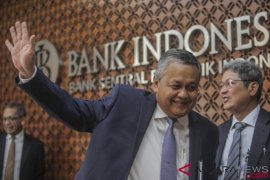"If the government`s assumption is 6.7 percent, then according to our calculations, it will only be 6.5 percent as world economic growth is predicted to drop from 4.5 percent to 4.0 percent," Perry said.Jakarta (ANTARA News) - Indonesia`s economy in 2012 will grow 6.5 percent, or slower than 6.7 percent as assumed in the Draft 2012 State Budget, Bank Indonesia (BI)`s Director for Economic Research and Monetary Policy, Perry Warjiyo said.
"If the government`s assumption is 6.7 percent, then according to our calculations, it will only be 6.5 percent as world economic growth is predicted to drop from 4.5 percent to 4.0 percent," Perry said here Tuesday.
He said the impact of the economic crisis in the United States and Europe on the Indonesian economy would be felt further in 2012 through a decrease in exports and lower demand for several commodities and consequently a reduction in their prices.
"The impact on the national economy will not be so big except on the stock and money markets but in the long run it may be more serious," he said.
Thus, he said, an economic strategy and policy were needed to anticipate the possible bad impact of the economic crisis in Europe.
He said economic stimuli were needed to boost economic growth from inside especially through investment including import substitution and penetration of foreign markets to support exports particularly to such emerging countries as China, Brazil, India and South Africa.
In the monetary sector, BI had made a reorientation of its policies on interest rates, exchange rates, foreign exchange and bank credits to boost growth by maintaining sustainability through an increase in absorption and efficiency as well as creating fiscal space, he said.
He pointed out the weakening of the rupiah over the past two weeks was also caused by worries among portfolio investors about the crisis in Europe.
However, Indonesia`s foreign exchange reserves are believed to be still strong to prevent the rupiah from weakening further due to pressures on the money market as the impact of the economic crisis in Europe.
The rupiah`s exchange rate continued to weaken over the past week from its earlier position of Rp8,550 per US dollar to Rp9,035 per US dollar on Tuesday (Sept 20).
He said with the country`s foreign exchange reserves reaching US$122 billion last week, BI would be ready to intervene in the money market by selling dollars and using the rupiahs obtained from the sale to buy state bonds on the secondary market.
"We will maintain it to prevent the rupiah`s exchange rate from fluctuating too sharply in keeping with the conditions of other countries in the region, and in such a condition, it was normal if BI intervened in the money market by selling dollars and using the rupiahs earned to buy state bonds," he said.(*)
Editor: Heru Purwanto
Copyright © ANTARA 2011








